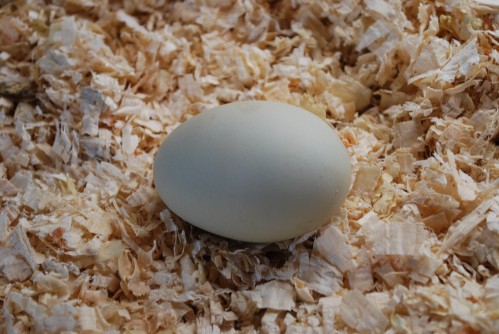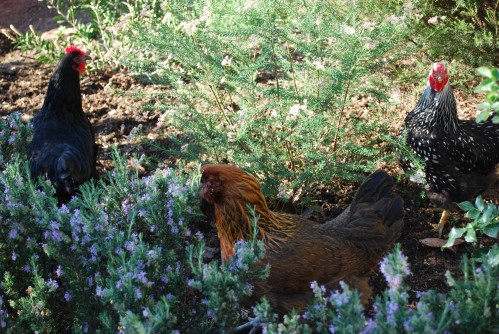 Yesterday morning, I was opening up the shutters and door of the chicken coop for my hens to start their day, and I spotted a "miracle egg" in one of their nesting boxes. Miracle, because it was simply perfect in shape, size, and shell. Miracle, because it was a beautiful pastel blue-green colored egg, laid by Julia, my honey-colored Ameraucana hen. Miracle, because eggs are more of a rarity than the norm in our flock these days. Miracle, because Julia is a six-year old hen, hopelessly past her egg-laying prime, and please don't tell her. Miracle, because it is yet another sign of spring approaching, with increasing daylight lengths stimulating Julia to lay a perfect egg.
Yesterday morning, I was opening up the shutters and door of the chicken coop for my hens to start their day, and I spotted a "miracle egg" in one of their nesting boxes. Miracle, because it was simply perfect in shape, size, and shell. Miracle, because it was a beautiful pastel blue-green colored egg, laid by Julia, my honey-colored Ameraucana hen. Miracle, because eggs are more of a rarity than the norm in our flock these days. Miracle, because Julia is a six-year old hen, hopelessly past her egg-laying prime, and please don't tell her. Miracle, because it is yet another sign of spring approaching, with increasing daylight lengths stimulating Julia to lay a perfect egg.
Fresh laid eggs are an incredible joy. One of the last things a hen does before she lays her egg is put a thin protective transparent coating over the egg. This locks in freshness, and you should never wash fresh eggs, except if they have gotten dirty with a manure dropping, mud, or something. This is nature's organic way of keeping the egg fresh. Once you gather your fresh laid eggs, you will want to put them in your refrigerator.
Fresh laid eggs, can still be warm from a hen's body, and warm in your hand. This is surely one of life's simple pleasures to experience, and reinforces my bliss in raising and growing your own food.
Some hens cackle a bit when laying an egg, confirming it is an in depth process for them. Hens laying eggs regularly, usually lay their eggs in the morning to early afternoon. When you provide nesting boxes for your hens, with fresh pine shavings or straw, hens instinctively know where to lay their eggs. Sometimes hens will lay all their eggs together in one nesting box, as if it were a party. More often, they use separate nesting boxes. Your eggs will keep fresh, and unharmed, until you collect and gather them.
Each chicken breed lays an egg of a particular eggshell color, that remains constant to that breed. For instance, a Rhode Island Red hen will only lay brown eggs. What a hen eats is the big difference in eggs, and determines the amazing color of their egg yolks and taste of their eggs.
There is such a dramatic difference in cooking, baking, and eating with fresh eggs, I am astounded. I have to smile at friends and family reactions when I cook them breakfast for the first time with our fresh eggs, or give a friend a dozen fresh eggs as a hostess gift.
Happy backyard hens who eat a protein laying mash*, enjoy fresh fruit and vegetable treats, as well as the pickings of a yard or garden for bugs and worms, will lay truly incredible "golden" eggs for you, your family, and friends to enjoy.
-Glossary-
*Laying Mash, complete diet for laying chickens, usually made up of cracked corn, soybean meal, oyster shell pieces, and other nutrients.

 In the photo above are my beloved hens, Louise, Julia, and J.Lo, named after the posh Hollywood crowd. Believe me, besides being pretty, they have attitude, too.
In the photo above are my beloved hens, Louise, Julia, and J.Lo, named after the posh Hollywood crowd. Believe me, besides being pretty, they have attitude, too.